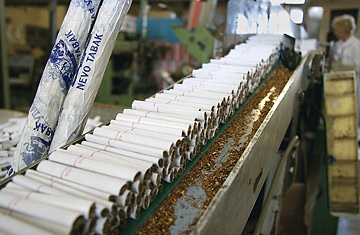
Cigarettes on a production line.
It is shaping up to be a bad couple of weeks for the tobacco lobby. First, a Senate panel approved a 61-cent hike in federal taxes on all packs of smokes, and next week a second committee is expected take up legislation to have tobacco regulated by the Food and Drug Administration (FDA).
On Thursday, the Senate Finance Committee approved by a vote of 17-4 legislation to continue funding for S-CHIP, the federal program that has successfully insured over seven million of America's poorest children since it began in 1997 — funded by increased taxes on cigarettes, cigars and other tobacco products. The higher taxes would fund SCHIP coverage for an additional 3.3 million children.
Meanwhile, the Senate Health, Education, Labor and Pension Committee on Wednesday is scheduled to report out Senator Ted Kennedy's latest attempt at regulating tobacco products — he has tried and failed to pass similar bills four years running. This year's measure — which actually enjoys the support of Phillip Morris, the producer of Marlboro and the largest U.S. cigarette manufacturer — adds a controversial clause that would permit the use of cloves as a cigarette additive. Phillip Morris, a division of Altria, spent $5 billion in 2005 to buy a controlling stake in Sampoerna of Indonesia, a large maker of clove cigarettes.
While the clove provision didn't please the American Lung Association and other groups, it hasn't cost their support — the measure to give the FDA oversight has been endorsed by every major U.S. health group. The FDA would almost certainly force cigarette manufacturers to list their ingredients, remove some harmful chemicals, further tighten advertising restrictions and prevent cigarette companies from making their product more addictive.
Kennedy's measure is opposed by most Republicans (it has 52 co-sponsors, including 12 Republicans) on the grounds that it would essentially force the FDA to grant approval of something that is clearly bad for people, said Senator Michael Enzi of Wyoming, the panel's top Republican. "We know that there is no such thing as a safe cigarette," Enzi said in a release. "Proposals to have FDA regulate tobacco are a misguided attempt to force a deadly product into the regulatory structure developed for drugs and devices — products which do have health benefits." Enzi Thursday introduced his own legislation to "cap and trade" tobacco products in order to shrink U.S. use of tobacco products to 2% of the population over 20 years.
Kennedy's bill also splits the tobacco lobby by pitting Philllip Morris against everyone else. Companies like R. J. Reynolds, the maker of the Camel brand of cigarettes and the second largest U.S. manufacturer of tobacco products, oppose the measure on the grounds that the limits the FDA would impose on advertising would effectively lock in market share, favoring the market leader Phillip Morris.
The HELP Committee mark-up was originally scheduled to be held last Wednesday, but was postponed after the Senate held an all-night debate over a timeline to withdraw troops from Iraq. Bleary-eyed, the Senate Finance Committee still managed to pass their legislation 17-4 with most Republicans voting in defiance of President George W. Bush's veto threat against the measure. It "is good policy," Senator Charles Grassley of Iowa, the panel's top Republican, said in endorsing the package.
Bush —who is trying to keep down spending — has agreed to a $5 billion per year increase, for a total of $25 billion over five years, and tackling the problem of the uninsured by subsidizing private insurance policies. The bill that emerged from the panel provides for a $35 billion increase over five years. Senator Jay Rockefeller, a West Virginia Democrat and one of the bill's architects, said that if Bush "really wants to veto this bill because we're $10 billion apart, then I say go right ahead."
Both sides of the aisle pointed to presidential waivers that had allowed about 700,000 low-income adults, parents and pregnant women to receive S-CHIP coverage in 2006, and that Bush's own Administration has encouraged governors to expand the program.
The House, meanwhile, is working on a $50 billion increase — a move that would cause many Senate Republicans to pull their support for the measure. Grassley said he would wait and see what emerges from conference with the House before deciding if he can support a final product. Both chambers are working under deadline pressure as the program expires September 30, which would potentially leave millions of children suddenly without health insurance.
